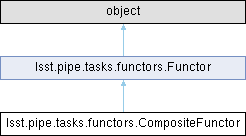
Public Member Functions | |
| __init__ (self, funcs, **kwargs) | |
| filt (self) | |
| filt (self, filt) | |
| update (self, new) | |
| columns (self) | |
| multilevelColumns (self, data, **kwargs) | |
| __call__ (self, data, **kwargs) | |
| renameCol (cls, col, renameRules) | |
| from_file (cls, filename, **kwargs) | |
| from_yaml (cls, translationDefinition, **kwargs) | |
Public Attributes | |
| funcDict | |
| filt | |
| name | |
Static Public Attributes | |
| dataset = None | |
| str | name = "CompositeFunctor" |
Protected Attributes | |
| _filt | |
Detailed Description
Perform multiple calculations at once on a catalog.
The role of a `CompositeFunctor` is to group together computations from
multiple functors.
Instead of returning `~pandas.Series` a `CompositeFunctor` returns a
`~pandas.DataFrame`, with the column names being the keys of ``funcDict``.
The `columns` attribute of a `CompositeFunctor` is the union of all columns
in all the component functors.
A `CompositeFunctor` does not use a `_func` method itself; rather, when a
`CompositeFunctor` is called, all its columns are loaded at once, and the
resulting DataFrame is passed to the `_func` method of each component
functor.
This has the advantage of only doing I/O (reading from parquet file) once,
and works because each individual `_func` method of each component functor
does not care if there are *extra* columns in the DataFrame being passed;
only that it must contain *at least* the `columns` it expects.
An important and useful class method is `from_yaml`, which takes as an
argument the path to a YAML file specifying a collection of functors.
Parameters
----------
funcs : `dict` or `list`
Dictionary or list of functors.
If a list, then it will be converted into a dictonary according to the
`.shortname` attribute of each functor.
Definition at line 377 of file functors.py.
Constructor & Destructor Documentation
◆ __init__()
| lsst.pipe.tasks.functors.CompositeFunctor.__init__ | ( | self, | |
| funcs, | |||
| ** | kwargs ) |
Reimplemented from lsst.pipe.tasks.functors.Functor.
Definition at line 410 of file functors.py.
Member Function Documentation
◆ __call__()
| lsst.pipe.tasks.functors.CompositeFunctor.__call__ | ( | self, | |
| data, | |||
| ** | kwargs ) |
Apply the functor to the data table.
Parameters
----------
data : various
The data represented as `~lsst.daf.butler.DeferredDatasetHandle`,
`~lsst.pipe.base.InMemoryDatasetHandle`, or `~pandas.DataFrame`.
The table or a pointer to a table on disk from which columns can
be accessed.
Reimplemented from lsst.pipe.tasks.functors.Functor.
Definition at line 464 of file functors.py.
◆ columns()
| lsst.pipe.tasks.functors.CompositeFunctor.columns | ( | self | ) |
Columns required to perform calculation.
Reimplemented from lsst.pipe.tasks.functors.Functor.
Definition at line 446 of file functors.py.
◆ filt() [1/2]
| lsst.pipe.tasks.functors.CompositeFunctor.filt | ( | self | ) |
Reimplemented from lsst.pipe.tasks.functors.Functor.
Definition at line 422 of file functors.py.
◆ filt() [2/2]
| lsst.pipe.tasks.functors.CompositeFunctor.filt | ( | self, | |
| filt ) |
Reimplemented from lsst.pipe.tasks.functors.Functor.
Definition at line 426 of file functors.py.
◆ from_file()
| lsst.pipe.tasks.functors.CompositeFunctor.from_file | ( | cls, | |
| filename, | |||
| ** | kwargs ) |
Definition at line 539 of file functors.py.
◆ from_yaml()
| lsst.pipe.tasks.functors.CompositeFunctor.from_yaml | ( | cls, | |
| translationDefinition, | |||
| ** | kwargs ) |
Definition at line 548 of file functors.py.
◆ multilevelColumns()
| lsst.pipe.tasks.functors.CompositeFunctor.multilevelColumns | ( | self, | |
| data, | |||
| ** | columnIndex ) |
Returns columns needed by functor from multilevel dataset.
To access tables with multilevel column structure, the
`~lsst.daf.butler.DeferredDatasetHandle` or
`~lsst.pipe.base.InMemoryDatasetHandle` needs to be passed
either a list of tuples or a dictionary.
Parameters
----------
data : various
The data as either `~lsst.daf.butler.DeferredDatasetHandle`, or
`~lsst.pipe.base.InMemoryDatasetHandle`.
columnIndex (optional): pandas `~pandas.Index` object
Either passed or read in from
`~lsst.daf.butler.DeferredDatasetHandle`.
`returnTuple` : `bool`
If true, then return a list of tuples rather than the column
dictionary specification.
This is set to `True` by `CompositeFunctor` in order to be able to
combine columns from the various component functors.
Reimplemented from lsst.pipe.tasks.functors.Functor.
Definition at line 449 of file functors.py.
◆ renameCol()
| lsst.pipe.tasks.functors.CompositeFunctor.renameCol | ( | cls, | |
| col, | |||
| renameRules ) |
Definition at line 530 of file functors.py.
◆ update()
| lsst.pipe.tasks.functors.CompositeFunctor.update | ( | self, | |
| new ) |
Update the functor with new functors.
Definition at line 432 of file functors.py.
Member Data Documentation
◆ _filt
|
protected |
Definition at line 417 of file functors.py.
◆ dataset
|
static |
Definition at line 407 of file functors.py.
◆ filt
| lsst.pipe.tasks.functors.CompositeFunctor.filt |
Definition at line 443 of file functors.py.
◆ funcDict
| lsst.pipe.tasks.functors.CompositeFunctor.funcDict |
Definition at line 413 of file functors.py.
◆ name [1/2]
|
static |
Definition at line 408 of file functors.py.
◆ name [2/2]
| lsst.pipe.tasks.functors.CompositeFunctor.name |
Definition at line 498 of file functors.py.
The documentation for this class was generated from the following file:
- /j/snowflake/release/lsstsw/stack/lsst-scipipe-8.0.0/Linux64/pipe_tasks/g2a9a014e59+6f9be1b9cd/python/lsst/pipe/tasks/functors.py